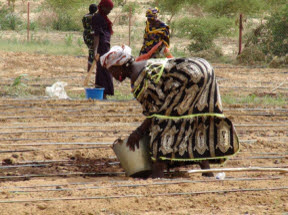This piece is part of Water Grabbers: A Global Rush on Freshwater, a special National Geographic News series on how grabbing land—and water—from poor people, desperate governments, and future generations threatens global food security, environmental sustainability, and local cultures
A spontaneous, largely under-the-radar blue revolution is gaining steam in sub-Saharan Africa and has the potential to boost food security and incomes for tens of millions of the region’s poorest inhabitants.
Small-scale irrigation techniques with simple buckets, affordable pumps, drip lines, and other equipment are enabling farm families to weather dry seasons, raise yields, diversify their crops, and lift themselves out of poverty.
But unless African governments and foreign interests lend support to these farmer-driven initiatives, rather than undermine them through land and water deals that benefit large-scale, commercial schemes, the best opportunity in decades for societal advancement in the region will be squandered.
Worldwide, as the limits of available water become ever more apparent, the rush is on to acquire more of the precious liquid before there’s none to be had. Government and business interests from China, India, Saudi Arabia, the United States, and other countries that have depleted many of their own water sources are now acquiring access to the land and water of other nations – especially poor ones – to rake in profits and secure food supplies.
The 2008 spike in global food prices unleashed a frenzy of land and water deals that threaten not only the livelihoods of millions but also the geopolitical security of nations.
Nowhere is this more evident than in Africa, especially poor countries south of the Sahara. Business and government interests are targeting Ethiopia, Mali, Sudan, and other underdeveloped nations to capitalize on their “underutilized” farmlands and waters.
Although pitched as investments to advance economic development, many of these deals are not only failing to deliver promised benefits, they are destroying the livelihoods of traditional farmers, herders, and fisherfolk.
Today, hunger is endemic in sub-Saharan Africa. The 2012 Global Hunger Index ranks forty-two of the forty-five countries in the region for which data are available at “serious” or “alarming” levels. Nearly one in four children are underweight. More
